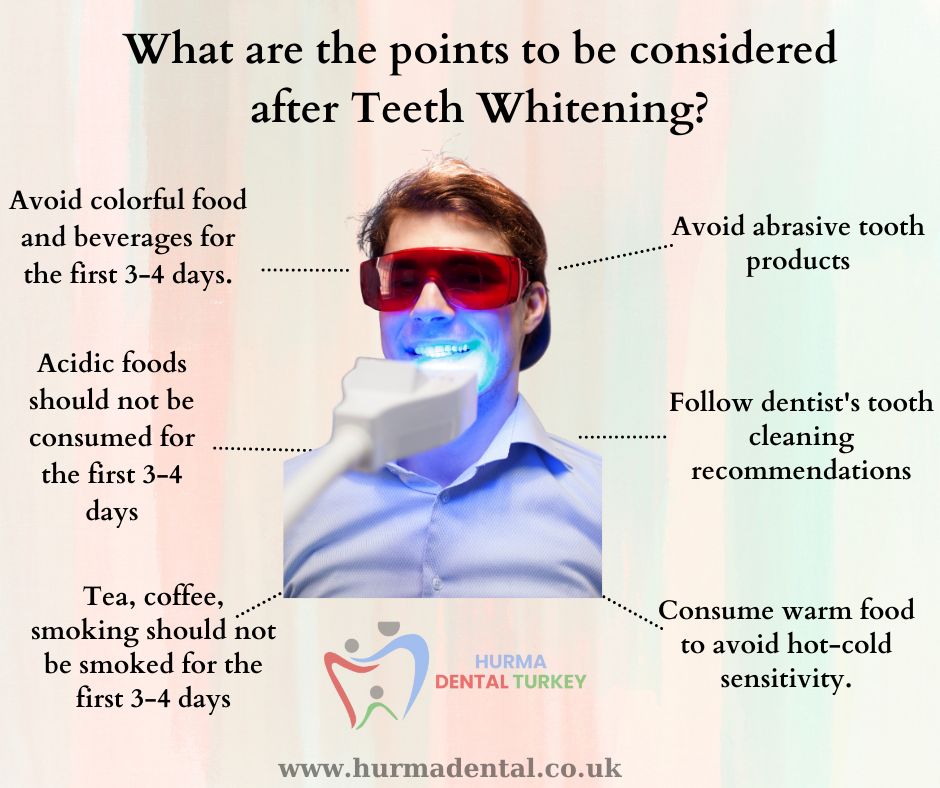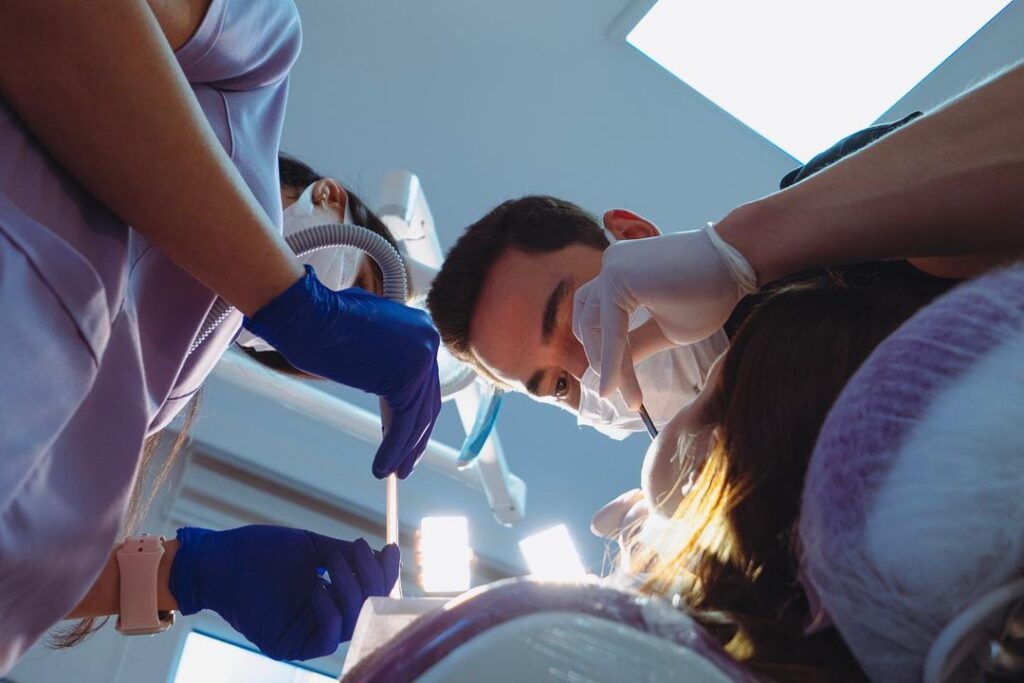Teeth Whitening Turkey - Teeth Bleaching
Laser Teeth Whitening In Antalya, Turkey
Trust – Honesty – Experience
What is Teeth Whitening?
Teeth Whitening (Bleaching); It is the process of restoring the old whiteness of the tooth by removing the color change in the enamel layer our specialist dentists in our clinic through various substances and procedures.
Teeth Whitening is the most important smile design procedure. Bleaching (Teeth Whitening) process nowadays; is an aesthetic dental procedure that is not harmful, looks beautiful, and creates an impressive, white smile. Healthy and white teeth are of great importance in terms of aesthetic appearance. Teeth Whitening; It is the removal of stains formed by organic or inorganic substances that are formed later on the enamel layer on the tooth surface with different methods. It is a form of cosmetic treatment that has been used a lot by dentists in recent years.
White teeth mean healthy teeth. White, healthy, and bright teeth improve the sense of self-confidence in people. This sense of trust also allows you to smile comfortably.
The outermost layer of enamel gives the tooth its whiteness and shine. It is the hardest substance in the body. However, due to aging and some foods consumed, the enamel layer will become thinner over time. Again, micro-cracks will occur in the enamel layer over the years. The food we eat and drink will fill in the microcracks. This thinning and micro-cracks will cause the tooth to change color.
The Teeth Whitening method removes these color changes and makes your teeth white as before.

What are the benefits of Teeth Whitening?
Man is a social being. It lives with other people. While living together, they are affected by each other’s beautiful sides. This influence can be mental as well as physical. One of the bodily influences is the condition of our teeth. The neglected and yellow teeth in our mouths can negatively affect how people look at us. Therefore, our teeth must look well-groomed and white. Teeth Whitening; psychologically relaxes people, makes them look good, and affects their social status. Thus, our appearance becomes more beautiful; it is carried to the next level, and our self-confidence increases.
In which cases is Teeth Whitening done?
Pathological discoloration of teeth,
Age-related tooth discoloration,
In cases where the patient does not like the tooth color,
Teeth Whitening is applied in case of tooth discoloration caused by food, drink, or medication.
To whom is Teeth Whitening done?
Although the patient portfolio for Teeth Whitening is quite wide, there should not be some problems in patients who will undergo Teeth Whitening. Here we will talk about who should not apply for Teeth Whitening.
For those younger than 16 years old (pulp may be damaged),
Those with poor oral hygiene,
Those who have excessive wear on their teeth,
Those who have exposed most of the tooth roots,
Those who have structural dental problems related to the enamel and dentin layers (enamel layer development disorder and structural disorder of the dentin tissue),
Pregnant and lactating mothers,
Those who have broken, cracked, and sensitive teeth,
Those who have advanced gingival recession,
Those who have excessive tetracycline discoloration in the teeth (tetracycline group antibiotics used at early ages cause discoloration on the teeth),
Teeth Whitening is not done for those allergic to the substances used in Teeth Whitening.
Our patients who want to benefit from this procedure are examined by our specialist dentists in our clinic, and their conditions are checked. It is evaluated whether they are suitable for the bleaching process. This procedure is made for those whose health condition is suitable.
Who should not have Bleaching?
Persons under the age of 15,
Those who have yellow teeth genetically.
Those whose jaw bone structure has not yet developed,
Those with orthodontic problems should have it done before meeting with the dentist.
Until the oral and dental treatments of those whose oral and dental health are not suitable are completed,
In some people, the enamel layer may not form in the permanent teeth that come after the primary teeth genetically. Teeth may appear yellow because there is no enamel layer. In such cases, dental veneer (zirconium veneer, empress veneer, laminated veneer) is recommended. In genetic cases, jawbone structure and age are also important for the procedures to be performed.
What are the Teeth Whitening methods?
There are six types of Teeth Whitening methods:
Patient undergoing teeth whitening treatment at Hurma Dental Clinic
Office-type Teeth Whitening (Office Bleaching):
This method is method consists of Tooth Whitening gel lightly applied by the dentist in the dentist’s clinic.
Home Bleaching:
It is the method the patient applies by putting the Teeth Whitening gel at home into the whitening plates prepared by the physician.
Single Teeth Whitening:
In this method, the inside of the tooth is whitened.
Combined Teeth Whitening:
It is a method in which office type and home-type whitening are used together. The procedure starts in the office and is supported by home bleaching for 2-3 days.
Biological Teeth Whitening:
While it provides whitening to the teeth, it also repairs tooth enamel. It is a method with a low risk of causing sensitivity in the tooth.
Laser Teeth Whitening:
It is the same as the office type Teeth Whitening method. The difference between the two is that the laser is used instead of light in this method.
Of the above-mentioned Teeth Whitening methods, office-type Teeth Whitening and home-type Teeth Whitening methods are mostly used.
What are the points to be considered after Teeth Whitening?
Food and beverage with coloring properties should not be consumed in the first 3-4 days,
Acidic foods should not be consumed for the first 3-4 days,
Tea, coffee, smoking should not be smoked for the first 3-4 days,
Products with abrasive effect on teeth should not be used,
Tooth cleaning should be done by the recommendation of the dentist,
Care should be taken to ensure that the food consumed is warm in order to avoid hot-cold sensitivity.
How long does Teeth Whitening last?
According to the NHS(England National Health System) , teeth whitening does not last forever. It can last from a few months to 3 years – this varies from person to person. If you use tobacco products or drink red wine, tea or coffee, which can stain your teeth, the whitening effect will not last as long.
Does Teeth Whitening cause sensitivity?
Due to the infiltration of bleaching agents into enamel, teeth whitening can lead to temporary discomfort from nerve endings. As the dentin layer connected to these nerves is affected, sensitivity can differ in its duration and intensity. To reduce sensitivity, it’s recommended that professional-grade whitening products are utilized, along with following proper guidance. If sensitivity lingers or worsens, consulting with a dentist is advisable.
Frequently Asked Questions
Tooth Bleaching fees vary according to the clinic where the procedure is made, the experience of the physician, the number of sessions performed, and the amount and quality of the materials used.
To see our current prices, visit our price page.
Teeth Bleaching is not a painful procedure. In some patients, a slight sensitivity may occur during and after the procedure, and this will pass in a short time.
Tooth yellowing is due to the following reasons:
Beverages such as cigarettes, tea, coffee, cola, vinegar, alcohol,
Foods containing chocolate and food coloring,
Foods such as blueberry, raspberry, cranberry, blackberry (cause stain formation due to the antioxidants they have),
Food sauces,
Ingestion of too much fluoride for a very long time,
Structural disorders during tooth formation in childhood,
Some medical treatments (such as chemotherapy),
Genetic structure of the person,
Tooth traumas (causing micro-cracks),
Thinning of the enamel layer due to aging,
Some antibiotics are used in the womb.

Join them now and get the best treatments.
Please do not hesitate to contact us if you have any question. We will reply you back as soon as possible